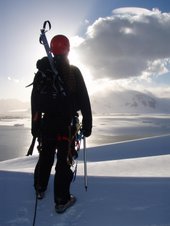I first became aware of the term ‘Bivi Bag’ a few weeks ago while eating breakfast. A conversation was on going around me that I was quite intrigued by, but one I realised that to have any means of contributing to I would need to have an actual definition of Bivi.
The explanation was quite forthcoming, and after absorbing it for a few seconds, I stared back expecting everyone to suddenly burst out laughing. But no, the se rious expressions continued, as did the conversation! The preverbal was surely being taken, but glancing around the breakfast table expecting to find sniggers directed at my lack of ‘outdoor’ knowledge, but again no, a typical morning: overly happy morning people being happily ignored by overly unhappy morning people.
rious expressions continued, as did the conversation! The preverbal was surely being taken, but glancing around the breakfast table expecting to find sniggers directed at my lack of ‘outdoor’ knowledge, but again no, a typical morning: overly happy morning people being happily ignored by overly unhappy morning people.
The reason for my ‘taken-a-back-ness’ was the definition, which in summary is a small lightweight bag you simply put down on the ground (ice and snow in our case) crawl in and go to sleep. No tent, just lay it on the ground completely out in the open, This is Antarctica!!! That just seems wrong.
It’s a kind of third backup system (after full Pyramid tent, and emergency Pup tent) when out in the field and everything has gone really, really pare! So with the outside temp approaching –20°C, up the hill we went with our Bivi’s. Bag laid out on the ground I crawl in and zipped myself up until there was only a small gap that I was peering out from lying on the snow.
One point of note however is another advantage of living on a continent that is one and a half times the size of the USA with zero air or light pollution is stargazing. This was the sight I stared at through the small gap in my Bivi zip as I drifted slowly to sleep.
The explanation was quite forthcoming, and after absorbing it for a few seconds, I stared back expecting everyone to suddenly burst out laughing. But no, the se
 rious expressions continued, as did the conversation! The preverbal was surely being taken, but glancing around the breakfast table expecting to find sniggers directed at my lack of ‘outdoor’ knowledge, but again no, a typical morning: overly happy morning people being happily ignored by overly unhappy morning people.
rious expressions continued, as did the conversation! The preverbal was surely being taken, but glancing around the breakfast table expecting to find sniggers directed at my lack of ‘outdoor’ knowledge, but again no, a typical morning: overly happy morning people being happily ignored by overly unhappy morning people.The reason for my ‘taken-a-back-ness’ was the definition, which in summary is a small lightweight bag you simply put down on the ground (ice and snow in our case) crawl in and go to sleep. No tent, just lay it on the ground completely out in the open, This is Antarctica!!! That just seems wrong.
It’s a kind of third backup system (after full Pyramid tent, and emergency Pup tent) when out in the field and everything has gone really, really pare! So with the outside temp approaching –20°C, up the hill we went with our Bivi’s. Bag laid out on the ground I crawl in and zipped myself up until there was only a small gap that I was peering out from lying on the snow.
One point of note however is another advantage of living on a continent that is one and a half times the size of the USA with zero air or light pollution is stargazing. This was the sight I stared at through the small gap in my Bivi zip as I drifted slowly to sleep.

Looking out from the bottom of the world, this is view of the galactic elliptical plane shinning brighter and clearer than I had ever seen.
The other shock of the night is that the bag was really really toastie!




